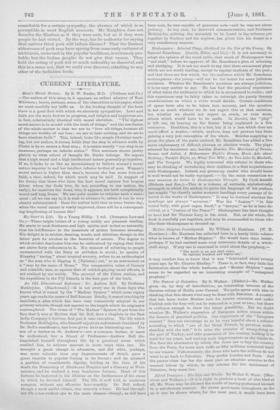Shakespeare : Selected Plays, Abridged for the Use of the
Young. By Samuel l3randram. (Smith, Elder, and Co.)—It is not necessary to adopt the opinion of the royal critic, that much of Shakespeare was "sad stuff," before wo approve of Mr. Brandram's plan of selecting and abridging. It is not too much to say that there are several plays which aro not worth reading, except to regular students of the poet ; and that there are few which, for the audience which Mr. Brandram contemplates—the young—will not be the better for some judicious excisions. Whether Mr. Brandram's excisions are always judicious, it is no easy matter to say. He has had the practical experience of what takes the audiences to which be is accustomed to recite; and this experience may be fairly taken to outweigh the purely literary considerations on which a critic would decide. Certain conditions of space have also to be taken into account, and the question is, not so ranch whether wo do not regret this or that omission, but whether we should not regret as much, or oven more, others which would have to be made. In Hamlet, the "play" is left out, its bearing on the drama being explained in a few sentences. Doubtless, this is a loss, but it is a loss which does not much affect a reader,—which, anyhow, does not prevent him from gaining a very just conception of the whole. Besides supplying in prose the place of the parts omitted, Mr. Brandram has added a few notes explanatory of difficult phrases or obsolete words. The plays selected for treatment are, besides Hamlet., The Merchant of Venice, Romeo and Juliet, A Midsummer Night's Dream, Much Ado about Nothing ; Twelfth Night, or, What Tea Will ; As Your Like It, Macbeth, and The Tempest. We highly commend this volume to those who may be thinking of introducing their children to a first acquaintance with Shakespeare. Indeed, any grown-up reader who should know it well would not be badly equipped.—In the same connection we may mention An Index to Shakesperian Thought. By Cecil Arnold. (Bickers and Son.)—This is a volume of extracts, alphabetically arranged, in which the author, to quote the language of his preface, has sought "to classify under accurate headings every passage of in- terest in the works of Shakespeare." It may be doubted whether the headings are always " accurate." Was the "Justice " " in fair round belly, with good capon lined," a lawyer," as he is here de- cribed, or a "Justice of the Peace !"' Shakespeare has been thought to have had Sir Thomas Lucy in his mind. But, on the whole, the book is carefully put together, and may be commended to those who like their Shakespeare so dressed up.


































 Previous page
Previous page